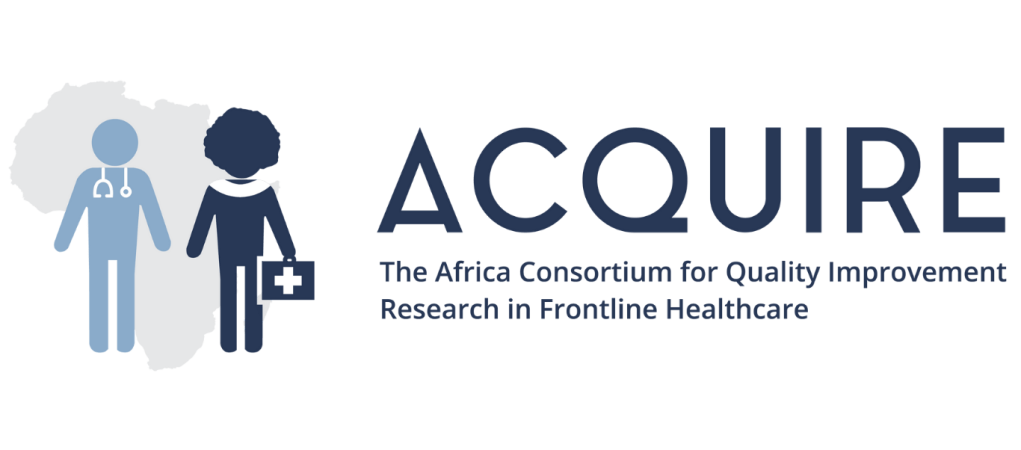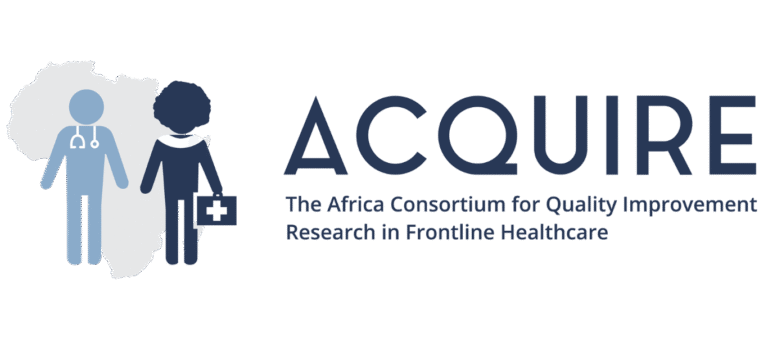The Africa Consortium for Quality Improvement Research (ACQUIRE) in Frontline Healthcare.

THE 2025 ACQUIRE QUALITY IMPROVEMENT LEADERSHIP FORUM
Co-Producing Safer Care: Centering Quality and Kindness from the Start
"Healthcare without quality is ineffective, wasteful, and hampers progress towards improved health outcomes"
Lancet Commission Report, 2019
Why Focus on the
Frontline?
The frontline healthcare worker is the only actor who knows what is really happening with the patient.
The frontline perspective is where the action happens. The health worker is the driver of systems thinking for contextually relevant, quality improvement in outcomes and patient-centered care.
Frontline health worker quality improvement happens when peers are working in cross-disciplinary teams, looking at real-time data, testing change ideas and creating feedback loops while co-producing new knowledge.
Working at the frontline democratises the health workers agency for change; it’s a bottom-up organic initiative versus top-down, siloed responses.
Why Do QI Our Way?
Frontline-led QI is a paradigm shift. We know what to do, but we don’t know how to do it consistently, excellently and at scale.
QI is the engine that drives SSA towards an implementation science strategy of change at the granular, frontline level where it meets the patients’ needs in real-time.
QI is implementation science leveraging evidence-based practice. At the center are feedback loops that allow for real time learning, accountability and measurable change – where data drives decision making at the frontline.
Key Patient Safety Facts by WHO
Around 1 in every 10 patients is harmed in health care and more than 3 million deaths occur annually due to unsafe care. In low-to-middle-income countries, as many as 4 in 100 people die from unsafe care.
Above 50% of harm (1 in every 20 patients) is preventable; half of this harm is attributed to medications.
Some estimates suggest that as many as 4 in 10 patients are harmed in primary and ambulatory settings, while up to 80% (23.6–85%) of this harm can be avoided.
Why is Addressing
Quality in Healthcare so Important?
Three in every five preventable deaths are due to poor quality of care at health facilities in low-and middle-income countries in sub-Saharan Africa. When a surgery leads to infection, antibiotics are overprescribed, or diabetic drugs are not used at the proper dose, and patients suffer.
Weak systems and processes are at fault in many of these healthcare institutions rather than the absence of trained healthcare workers, guidelines, and policies.
Building systems that efficiently and effectively deliver quality care is possible, but it must start at the frontline giving healthcare workers training in the science of quality improvement so that they can drive positive system changes right, where it matters most, at the bedside of the patient.
Three in every five preventable deaths are due to poor quality of care at health facilities in low-and middle-income countries in sub-Saharan Africa. When a surgery leads to infection, antibiotics are overprescribed, or diabetic drugs are not used at the proper dose, and patients suffer.
Weak systems and processes are at fault in many of these healthcare institutions rather than the absence of trained healthcare workers, guidelines, and policies.
Building systems that efficiently and effectively deliver quality care is possible, but it must start at the frontline giving healthcare workers training in the science of quality improvement so that they can drive positive system changes right, where it matters most, at the bedside of the patient.
Conference Sessions Insights

Session 6: Building Effective Leadership Communication and a Quality Improvement Community in African Healthcare
Session 6 of the ACQUIRE Quality Improvement (QI) Leadership Forum focused on strengthening leadership communication and establishing a community of practice for QI across African

Session 5: Intentional Leadership for Quality Improvement and Patient Safety
Session 5 of the ACQUIRE Quality Improvement (QI) Leadership Forum 2024 presented a powerful exploration of how intentional leadership drives advancements…

Session 4: Patient-Centered Care and Engaging Leadership for Quality Improvement
Session 4 of the ACQUIRE Quality Improvement (QI) Leadership Forum 2024 examined the pivotal role of patient-centered care (PCC) and the impact of engaged leadership
Webinars
ACQUIRE celebrated frontline healthcare champions in Sub-Saharan Africa, showing their dedication to transformative quality improvement during a webinar that inspired the entire healthcare community.
QI Champions
ACQUIRE’s #QIFridays is designed to spotlight the real, on-the-ground ways that healthcare workers are using Quality Improvement (QI) tools to drive meaningful change on this continent. The weekly features are personal and rooted in each champion’s lived experiences.
Introducing our #QIFridays champion for this week, Stephen Kizito, a Medical Laboratory officer at Lamu County Referral Hospital and the County Coordinator for Quality Assurance & Health Standards at the Department of Health – County Government Lamu.
view previously featured QI Champions
Activities
The ACQUIRE QI Leadership Forum
Building Quality Improvement into Africa’s Health System Agenda
How To Build A Culture Of Patient Care: Role Of Leadership In Driving Behavior Change
While uniting in our shared commitment to improve patient safety, especially as we observe this year’s World Patient Safety Day,
Put Patients First to Drive Quality Care from the bedside to the boardroom
By Dr. Mary Adam and Dr. Jackline Oluoch Aridi Last month the curtains came down on the inaugural African Consortium
ACQUIRE Media Coverage
The ACQUIRE QI Leadership Forum, held on July 18-19, 2024, garnered significant media attention, highlighting its profound impact on the
QI Story: Quality Improvement in Discharge Process at AIC Kijabe Hospital
QUALITY IMPROVEMENT-DISCHARGE PROCESS AT AIC KIJABE HOSPITAL By Tabitha Mwangi & Finance Manager AIC Kijabe Hospital The project aims to
Insights & Articles
REFLECTIONS FROM THE C-SUITE EXPERIENTIAL LEADERSHIP COURSE
ACQUIRE is co-creating a rare gathering of Kenya’s healthcare leaders for an intimate leadership roundtable with C-suite executives from seven Kenyan hospitals. This isn’t another lecture hall talk, but a vibrant exchange of battle-tested insights, the kind only leaders like
How QI Training is Transforming Patient Care in Nyandarua
The journey began with a two-day, in-person QI training where participants were introduced to the science and methods of Quality Improvement, an entirely new concept for most. This was the ignition point that sparked curiosity and opened minds to the possibility of doing things differently. This is how healthcare workers in Nyandarua were empowered and drove change right at the frontline re)
Congratulations to the 2025 ACQUIRE Experiential Leadership Cohorts
At 5:00 a.m., in the quiet corridors of a Level 5 hospital in Mbagathi Hospital in Nairobi, a nurse on duty scans the surgical prep board and pauses for a minute. The patient schedule at the facility is tight, and the staff is lean. She wonders aloud. There is so much to do, so much that needs to change, but I don’t know how to make a difference. What if she and others like her had the training they needed at the frontline to drive quality improvement processes right where they worked?
Why Measurement Matters – Reflections on Improvement Practice in SSA Healthcare
Quality Improvement in Africa and Why It Matters for ACQUIRE: “What’s the measurable impact?” It’s the question that echoes through every QI conversation and one that ACQUIRE embraces fully. In this blog, we explore how ACQUIRE is not only implementing Quality Improvement (QI) initiatives across Africa but also measuring, learning from, and adapting those efforts in real time.

Since 2020, ACQUIRE has conducted implementation research to guide healthcare workers in enhancing the quality of care across the African continent.
Our Big Idea
ACQUIRE seeks to build learning health systems that ensure high-quality healthcare for everyone in sub-Saharan Africa.

Our Vision
Healthcare systems are characterized by continuous learning that results in quality care for all.
Our Mission
To strengthen the capacity of frontline healthcare workers, institutions, and governments to apply rigorously-performed, quality improvement research to everyday practice in Sub-Saharan Africa.


